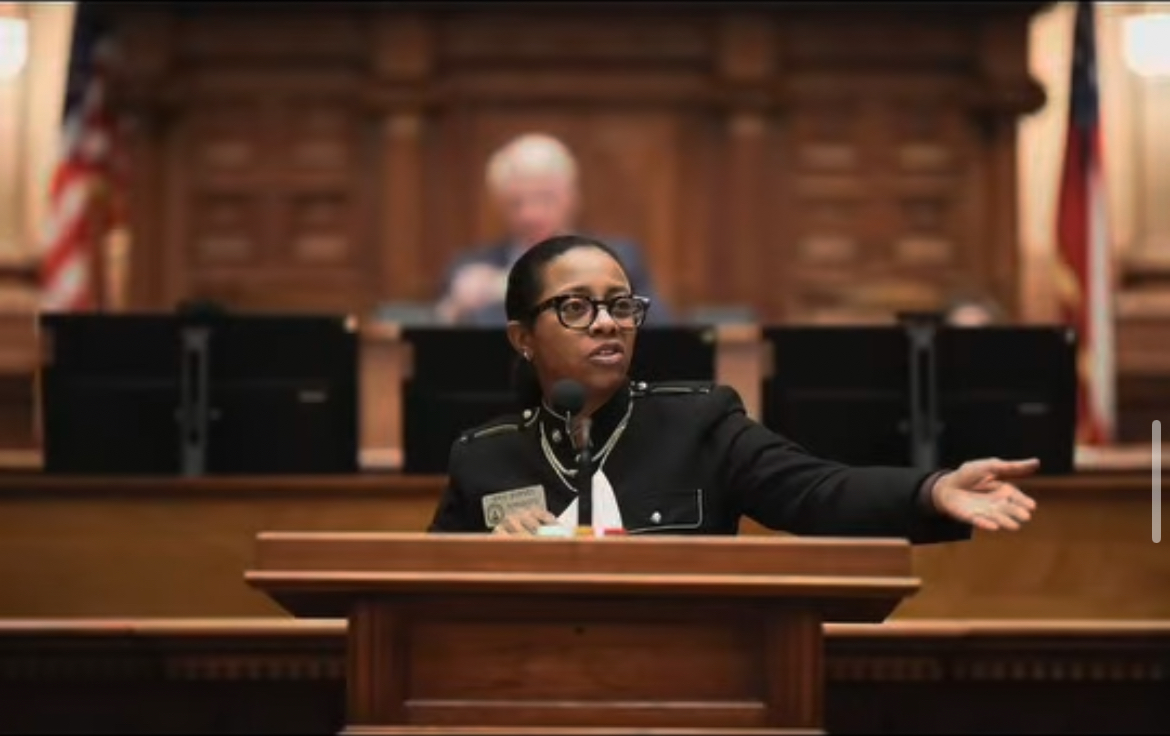State Superintendent Richard Woods has released several statements on whether or not the Advanced Placement (AP) African American course will be approved and receive state funding. Woods originally did not approve the course, but subsequently reversed this decision.
Maynard Jackson High School began offering the class in 2022, AP African American studies teacher Rashad Brown said the course allows students to learn about the past to better understand the present.
“Students are allowed to explore the rich history of the African Diaspora, starting with the origins in Africa,” Brown said. “Doing this allows students to understand the ancient history of Africans and their significant contributions to civilization. It is a journey from the ancient past to the present and allows students to connect the experiences of early Africans to modern African Americans, with a broader understanding of culture, religion, and heritage.”
Brown believes the course is important for students to take so they can understand African American history.
“The information is important to students because it allows them to understand where they come from and connect to a legacy that doesn’t begin with slavery,” Brown said.“Understanding that slavery is not the starting point for African Americans is very important in elevating racial esteem and instilling a sense of pride. Also, students of other ethnicities gain a broader understanding of the rich heritage of African Americans, and their contributions to civilization.”
APS Board of Education At-Large representative Shivy Brooks said the class is especially relevant for Atlanta students.
“Much of what is taught in AP African American Studies, or even general African American Studies class or ethnic studies class, is in direct relationship to Atlanta’s impact and influence on the world at large, and especially America,” Brooks said. “For me, this is about Georgia kids getting to learn about Georgia’s contributions, Atlanta’s kids getting to learn about Atlanta’s contributions.”
Original Decision
Woods released his original statement on July 23 deciding not to approve the course. He further clarified why in another statement, citing Georgia’s Divisive Concepts Law as the reason AP African American studies should not be approved.
The Divisive Concepts Law bans the teaching of nine race related topics, “including one race or ethnicity is inherently superior to another race or ethnicity; 28 (B) The United States of America and the State of Georgia are fundamentally or 29 systemically racist.”
“After reviewing the content, it was clear that parts of the coursework did violate the [divisive concepts] law,” Woods’ July 31 statement said. “As with most states with laws like Georgia on this issue that have raised concerns, the most glaring violation is on the topic of intersectionality. There are additional areas of concern, but this topic raises the highest level of concern. If the Advanced Placement course had presented a comparative narrative with opposing views on this and other topics, an argument could be made that the course did not violate Georgia law.”
Brown said he would not support this decision and believed Woods made an error in citing the Divisive Concepts Law in his decision.
“My initial reaction to Superintendent Wood’s original decision to not approve the AP African American studies course, was that this will not stand and that I need to put my Superman cape on and get to work, serving as an advocate for student’s rights across the state of Georgia,” Brown said. “Furthermore, after reading the law he mentioned, I understood that his interpretation was in error, and that he would be required to follow the exemption clearly outlined and ultimately approve the course.”
Even though the course would not receive state funding after this original decision, districts were still able to administer the class using their own funds. APS decided to do this and Brooks said the decision came only hours after Woods’ initial statement.
“It was our interim superintendent Dr. Battle who made the decision as to how we would proceed and then notified the board of what that decision was,” Brooks said. “It all happened within hours of [Wood’s] announcement coming out, but the decision was made through our administration, not through our board. The board did support our administration deciding to continue to fund [AP African American Studies] with local funds.”
In addition to individually funding the course apart from the state, Brooks said the district has worked to increase the offering to other schools.
“We also expanded to additional schools,” Brooks said. “What I will say about our board’s inquiry after we announced that we were continuing to fund the class was ‘what can we do to expand this learning opportunity to every high school in our district.’”
Woods’ decision also faced criticism from other political figures. He received a letter from Georgia Gov. Brian Kemp, faced backlash from the Atlanta City Council in a press release from council president Doug Shipman, and from various teacher’s unions. This includes the Professional Association of Georgia Educators, Georgia’s largest educators association.
“I contacted the Department of Education quickly, within a day of learning of the decision, ” PAGE’s Director of Legislative Services Margaret Ciccarelli said. “We read about it in the media, like many other stakeholders did, which I think was an unfortunate way to learn about it. We asked for clarification about why this decision had been made. We also passed along feedback from a PAGE member who contacted us at the very beginning of the news. She prepared for this course out of pocket, without being paid, and took a course with the College Board over the summer. She was very excited to teach this course and only to learn before school started, or her district’s ability to teach the course was in jeopardy.”
Ciccarelli also believes announcing this near the start of the school year created confusion for many teachers.
“I think the timing of the decision did create hardship because it became public right before this year began, and teachers were already organized to teach the class, and in some school districts, students were already enrolled in the courses,” Ciccarelli said. “There was a degree of uncertainty that was kind of thrust upon parents and students and educators right as the school year began.”
Walk-back
Woods announced that after receiving advice from the State Attorney General’s office, that he would be reversing his original decision to not approve the AP African American Studies Course due to the Divisive Concepts Law. Woods’ further clarified in that statement that the Divisive Concepts Law does not apply to AP, IB or Dual Enrollment courses.
Brown said there was never any truth in saying AP African American Studies violated the law.
“Any simple reading of the Divisive Concepts law, indicates that there was never any validity to the claim that the course was in violation of the law,” Brown said. “Georgia law 20-1-11, specifically House Bill 1084, section (d)(6), clearly states, ‘Nothing in this Code section shall be construed or applied to prohibit the full and rigorous implementation of curricula, or elements of a curriculum, that are required as part of advanced placement, international baccalaureate, or dual enrollment coursework; provided, however, that such implementation is done in a professionally and academically appropriate manner and without espousing personal political beliefs.’”
Brown is happy the course is still approved, but said Woods should not have made this decision to begin with.
“I am happy that students will have the ability to take AP African American Studies, however this shouldn’t have happened in the first place,” Brown said. “I believe the voters of Georgia have an opportunity to elect a leader who can effectively serve the best interest of all our scholars, as this was very chaotic and disruptive to the school environment. A change at the leadership level is necessary to ensure that something like this never happens again.”
Brooks believes that despite the confusion and setbacks that the situation caused, it increased conversation in the state around the class and its importance.
“I see it as actually energizing the conversation that the class is even available,” Brooks said. “I think it is encouraging parents to start having conversations with their kids about, are you taking advantage of this opportunity. Yes, it’s not a great thing that we’re even having to fight for this or even have this conversation. However, I see the unintended benefit in it. We’re talking about it, and now we’re pushing the needle even more.”





















